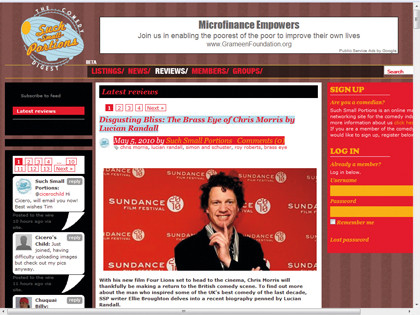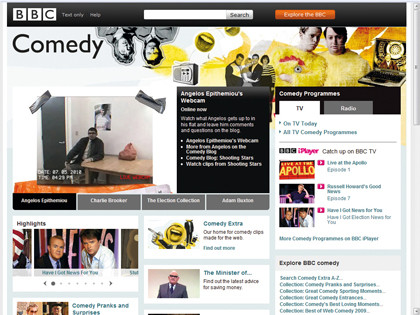How the web showcases bright new comedy stars
Offering up-and-coming acts a platform like never before
Sign up for breaking news, reviews, opinion, top tech deals, and more.
You are now subscribed
Your newsletter sign-up was successful
Another person who knows a thing or two about online comedy is Tim Clark, Editor of UK site www.suchsmallportions.com. Set up by journalism students in 2007, it's a popular networking site for the comedy industry.

Clark also believes the web is playing a very important role for comedy performers: "As a group, comedians have to be among the heaviest web users I know. Almost all of them have an opinion and they like to share it. I think comedy gets less exposure in the mainstream media than other genres, so blogs, Twitter and Facebook have filled the knowledge gap that exists."
And his advice for up-and-coming comedians? "Get involved with Facebook fan pages - and Twitter can help too. A lot of comedy bookers use YouTube to check out new people, so it helps to get a good clip of your act online and be aware of what your online biography (how you are described) is – and keep it up to date.
"If you get a bad review, don't take it too seriously, but contact the editor of the publication about it and ask to be re-reviewed at a later date. Ultimately, people are more in control of their media message (what is said about them) than at any time since the invention of the printing press – all they have to do is take advantage of it."
The last person we talked to is a man with more power than most to highlight new talent: Martin Trickey, the Multi-platform Commissioning Executive for Comedy and Entertainment at the BBC. It's a role he loves, as he says:
"My favourite part of the job is getting to laugh so much at work." It's part of his remit to find new writing and performing talent that the BBC can nurture and develop online – so how does he do it?
"In a variety of ways," he explains. "Some people come to us direct, sending in scripts or YouTube clips. This is great, but unless they have a production company behind them then it is difficult for us to work with them. Both new media and TV production companies pitch us ideas that we can then commission, and we also spend a lot of time online seeing who is popular and making people laugh."
Sign up for breaking news, reviews, opinion, top tech deals, and more.
So how does the BBC use its website to help new performers? "Part of the BBC comedy strategy is to use [our site] to showcase new talent – it's a quick and easy way to get new acts in front of an audience and get a reaction. It works well as we try to make quick decisions and turn things around in a few weeks, or for topical stuff, even days."

What should a new, aspiring comedian get involved with to get noticed by the BBC? "We keep an eye on YouTube and increasingly Vimeo for clips. I think Jon Petrie does a great job with Popcorn Comedy, so I try to go as often as I can or check out his site. I follow a lot of comedians on Twitter and see who they are talking about, and feeds such as B3ta links are really useful. I keep an eye on viral charts, and website Funny or Die has also produced some outstanding work. Mostly though, I get sent a lot of funny stuff via my email."
So there we have it – if there is one common theme across this entire community, it's that the best way to get noticed in the world of online comedy is to get out there and do something, and not to be put off by knockbacks at the start (or, for that matter, the middle).
The final word should go to Trickey: "The internet has made it possible for comedians to find an audience without a broadcaster or promoter and without being on the circuit for 10 years. I think this is liberating – but it doesn't make being funnier any easier."
-------------------------------------------------------------------------------------------------------
First published in PC Plus Issue 297
Liked this? Then check out 15 mind-bogglingly weird tech ads
Sign up for TechRadar's free Weird Week in Tech newsletter
Get the oddest tech stories of the week, plus the most popular news and reviews delivered straight to your inbox. Sign up at http://www.techradar.com/register
- 1
- 2
Current page: Taking your comedy online: spreading the word
Prev Page Taking your comedy online: keep it short!